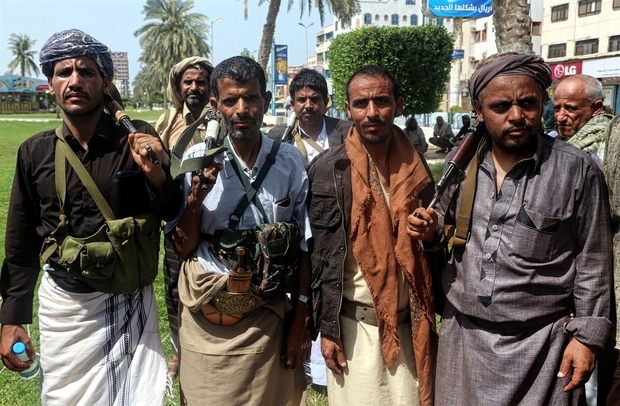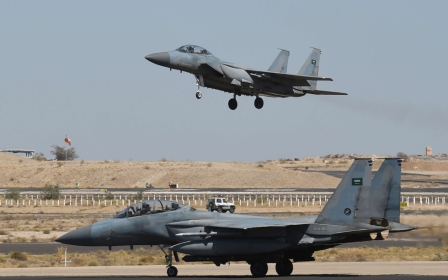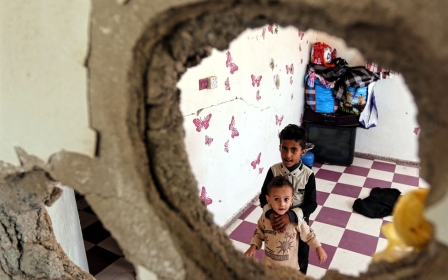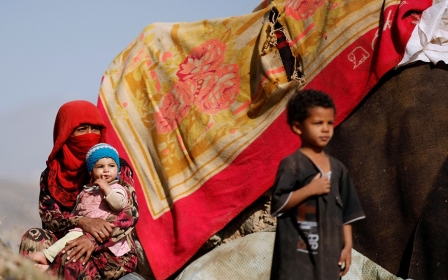Houthi minister defects as pro-government forces make gains in Hodeidah

A Houthi-aligned information minister has publicly announced his defection to Yemen’s internationally recognised government, as Saudi-backed forces made inroads into rebel-held strategic port Hodeidah.
Abdulsalem Jaber, who held a news conference in Riyadh on Sunday to explain his decision and express criticism of his former allies, had a shoe thrown at him in anger by a Yemeni journalist.
His defection comes as Saudi-backed forces loyal to the internationally recognised government are engaging with the Houthi rebels in fierce street-to-street fighting in eastern Hodeidah, a highly strategic port city.
The Saudi-backed troops entered the residential streets with the aim of "purging them of insurgents", a pro-government military official told the AFP news agency.
More than 400 people have been killed in 10 days of fighting in and around the city, including more than 60 in the last 24 hours.
Houthi fighters are entrenched in buildings and their snipers are positioned on rooftops.
They have been battling fiercely to stop the pro-government forces from taking a key neighbourhood between the main hospital and vegetable market, which are both essential facilities for Hodeidah's residents.
According to AFP reports, rebel tanks have been firing artillery rounds in an attempt to beat back the assault.
Residents said gunfire and shelling could be heard throughout the previous night.
"We had three people from our neighbourhood hospitalised over the weekend for shrapnel wounds," Marwa, who asked that her name be changed, told AFP.
"We're really tired. It's not safe. We have no money. This time no one is leaving. We can't afford it, and it's too dangerous."
Port uninterrupted
The battle for Hodeidah, located on the Red Sea coast, threatens to be one of the bloodiest of the three-year war, and could have devastating consequences for Yemen's beleaguered population.
Not only does the city hold 600,000 people, around half of whom are said to be children, but its port is the main conduit for commercial imports and foreign aid.
Aid groups warn that any disruption of the port's services could precipitate a devastating famine across the country.
The United Nations says that eight million Yemenis are on the brink of a famine that could be the worst the world has seen for 100 years.
So far, services at the port have been uninterrupted, a local official told AFP.
To the port's east, however, the battles were spreading.
Pro-government forces moved into a neighbourhood between Hodeidah's largest hospital and the Sanaa Road, which links the port city to the Houthi-held capital.
Fighters there battled around the Al-Waha (Oasis) Resort hotel complex, moving towards a civilian district south of the Sanaa Road and north of the 22 May Hospital, which pro-government forces captured on Saturday.
On Sunday, medics said at least 61 fighters had been killed over 24 hours, with dozens more wounded and evacuated to medical centres outside the city.
In the city, medics said 43 Houthis and nine pro-government fighters had been killed in that period.
'Only a tool'
Losing the city and control of its port would be a severe blow to the Houthi rebels, who took control of much of Yemen in 2015, before a Saudi-led coalition intervened and began rolling back their gains.
Jaber is thought to be the third Houthi minister to defect to the government of Yemeni President Abd Rabbuh Mansour Hadi.
The former Houthi minister has been in Riyadh for three days, according to Saudi Arabia’s al-Arabiya TV.
An official source at the Yemeni embassy in the Saudi capital told al-Arabiya that Jaber was "only a tool" of the Houthis' "that had no value".
"All he did was to be present through social media platforms," the source said.
The Saudi-led coalition backing Hadi has come under intense international scrutiny for the role it plays in the conflict.
The coalition's bombing campaign has been responsible for killing many civilians, including 40 schoolchildren travelling on a bus in August.
Meanwhile, its blockade on the country has contributed to the worsening humanitarian conditions and spiralling economic situation.
New MEE newsletter: Jerusalem Dispatch
Sign up to get the latest insights and analysis on Israel-Palestine, alongside Turkey Unpacked and other MEE newsletters
Middle East Eye delivers independent and unrivalled coverage and analysis of the Middle East, North Africa and beyond. To learn more about republishing this content and the associated fees, please fill out this form. More about MEE can be found here.





